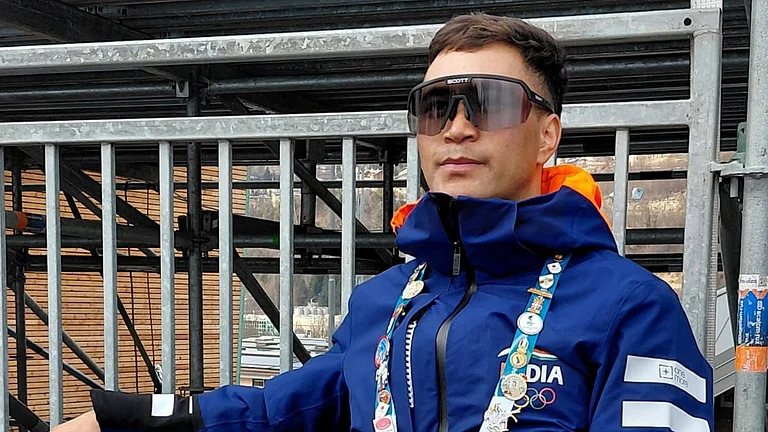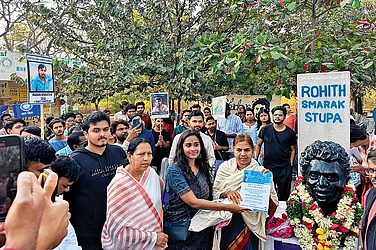Bindu Ammini is a guest lecturer at Government Law College in Kerala’s Kozhikkode. She teaches the Constitution. According to her will wishers, she is not only teaching it but preaching and practising it as well. She is one of the two women who made history by trekking to the top of the Sabarimala — until then a men’s world of devotion.
Bindu and Kanaka Durga are the first two women who entered the temple followed by the Supreme Court verdict lifting the ban on women in menstruating age from visiting the temple in September 2018. The people of Kerala woke up to the new year in 2019 with the ‘shocking news’ of two women —Bindu and Durga— successfully entering Sabarimala in the wee hours on the New Year’s Eve despite violent resistance by the Sangh Parivar groups.
Bindu and Durga were not known to each other before their journey to Sabarimala. Both of them met on their way and decided to go together on December 24, 2018. Though they were quite strangers before their entry to Sabarimala, the compelling reason for both of them to take a life-changing decision to enter the temple was all the same — to uphold the dignity of women.
“The Sangh Parivar only made me to take the decision to go. While watching the street violence against women on the way to Pampa, I felt insulted, humiliated, and injured as a woman. Hence I decided to go to uphold the dignity of women,” said Bindu to Outlook.
Followed by the landmark judgment by the Supreme Court in September 2018 that lifted the ban on women in menstruating age entering Sabarimala temple, Kerala witnessed sporadic incidents of violence unleashed by the Hindu Right. The Hindu Right vandalised vehicles and attacked women in the name of protecting the ‘celibate god’ Lord Ayyappa from ‘women who are impure by menstruation’.
On the roads to the temple, women were stopped and they were forced to disclose their age and were asked to show their identity cards. A handful of brave young women could not afford to bear with this public insult and hence decided to enter the temple. All the women who attempted were sent back by the police. Bindu and Durga who made their first attempt on 24th December 2018 in full media glare could not accomplish the wish. Later on December 31, both the women entered the temple, marking a significant moment in Indian history.
Like many other women who attempted to enter Sabarimala, followed by the Supreme Court verdict, Bindu too did not have an intention to be the first to enter. Born into a family of working class Dalit parents, life was a hard battle for Bindu who turned to activism in her early adolescence. During her student life, Bindu was an active member of Kerala Vidyarthi Sanghadana, the student wing of CPI-ML.
Bindu prefers to term herself as a Dalit activist. She has been a lawyer as well. As an activist and lawyer, handling criminal cases, dealing with cops, and even facing violence was nothing new for Bindu. But life has never been the same after her entry to the temple. She was threatened, manhandled, and had been subjected to cyber attacks several times.
Followed by relentless threats over phone and in person, Bindu sought for police protection which was granted by the Supreme Court. Despite having a protection order issued by the Supreme Court, she was manhandled a few times. On November 26, 2019, a group of Hindu right wingers attacked her and sprayed pepper spray on her face at the Commissioner Office in Kochi.
“I got little support from the police despite the incident happening under their nose. Though there were a group of people, only one person was arrayed as accused in the FIR,” said Bindu to Outlook.
Again in January 2022, Bindu was attacked by a man when she was returning from the office of a lawyer at Kozhikkode. The entire incident was caught on camera by some onlookers. In the brutal attack, she fell down on the road when she tried to resist and sustained injuries. The police arrested the assailant but he was later released on bail. The trial is yet to begin in this case.
Sabarimala was neither the first nor the last thing that in Bindu’s life. She went to Delhi to participate in the farmer’s struggle in 2021 and spent a whole year with the protesters, providing logistical support to the women in protest. Bindu established a space called ‘She Point’ in Wayanadu in Kerala to support women who are isolated and ostracised for various reasons.
“‘She Point’ is a space for women like me. ‘She Point’ provides a temporary living space for women who have no place to go and do as they wish,” said Bindu to Outlook.
Though three years have passed since Bindu entered the temple, the shockwaves created by the same have not yet subsided. The cyber attacks and slut-shaming through online platforms never came to an end.
“I get video calls from random people who display their private parts. When I was in Delhi on the streets with farmers, my phone was handled by children over there most of the time. Such video calls caused huge embarrassment to them too,” said Bindu to Outlook.
Bindu is least sceptical about the impact of episode of violence followed by the Supreme Court verdict and her entry to the temple.
“It was a critical moment in the history of Kerala which showed how deeply engraved caste and patriarchy is in this so-called progressive state. It exposed how casteist our society is. Though Kanaka Durga and me went together, she was less targeted than me because of her upper caste privilege,” said Bindu.
Between Durga and Bindu, there are very few similar things. They have more contrasts in common. Durga hails from an upper caste family and does not have a history of activism. She was quite an ordinary mother of two and an employee with the Civil Supplies Corporation who lived a life in a conservative patriarchal family where menstruation was considered impure. She was banned from entering Kitchen and the worshipping room at home during her menstruation days.
Like Bindu and many other women who attempted to go to Sabarimala, initially Durga also did not have any plan to go. If it is the violence unleashed against women in the street that provoked Bindu, the contemptuous remarks and discussions at home against the women provoked Durga.
Durga took the decision all by herself and got connected with a social media collective of like-minded people. However, what was waiting in the store was harsher than expected. She was not allowed to come back to her husband’s place. The husband and his mother kept Durga away from the family. All her efforts to meet the children also ended up in vain. Eventually, the relationship came to a close and Durga got divorced. Her legal battle to get the custody of the children also did not turn out to be fruitful.
Unlike Bindu, Durga remained out of the activist circle. She loved writing poems and participated in poetry gatherings which were forbidden in her marital home. She also strictly stayed away from the media glare. After the dust settled down, she who cherished her new life and refused to talk to the media despite repeated requests from many. Recently, she got married to an activist and former Naxalite Vilayodi Sivan Kutty. Though she does not talk to the media, it is apparently clear from her social media posts that she does not regret what she did.
“In a great democratic country like India, I am not sure whether we really respect and uphold the constitutional values. Even in this so-called progressive Kerala, the level of intolerance is growing and the freedom of expression and personal liberty are being crushed. Like many others, I also hope that we can make Kerala a better place to live. I am very much there in the path of resilience and resistance,” wrote Durga on January 6 as she announced her upcoming autobiography.





















